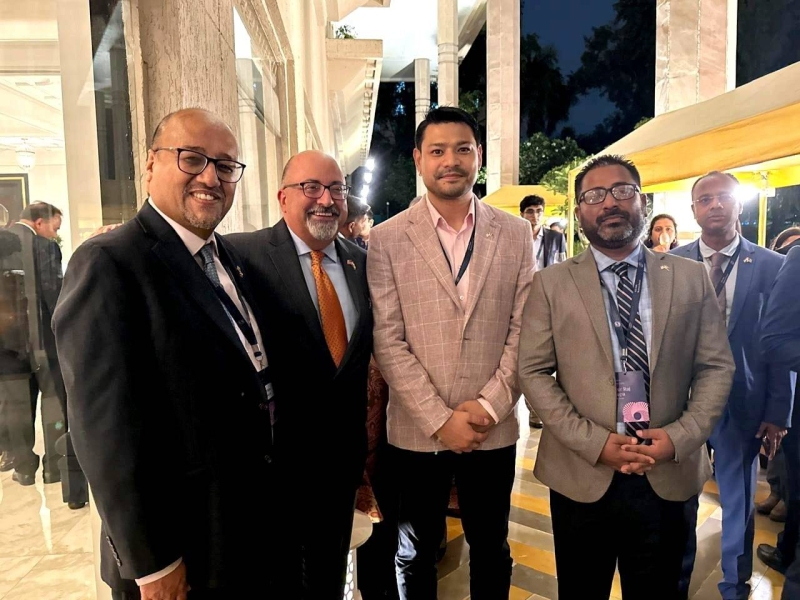
Recently, I read an article about Alvin Toffler's book Future Shock. The article highlighted his statement: "The illiterate of the 21st century will not be those who cannot read and write, but those who cannot learn, unlearn, and relearn." The article described this statement as a gem of an aphorism, woven into the rich fabric of a hugely significant book on business and culture as per Forbes magazine.
This statement resonated with me as I attended the India Ideas Summit 2024, organized by the US-India Business Council, on September 12, 2024, at the Taj Mahal Hotel in New Delhi. I was representing the American Chamber of Commerce in Nepal (AmCham Nepal) and deeply engaged as a participant. The India Ideas Summit, themed "Partnership and Prosperity in the Era of AI and Critical Technologies," brought together senior leaders from the US and India, policymakers, decision-makers, technical experts, and professionals.

Participants were energized by the ambition of both countries to ensure that technology serves the global good. With the US and India aspiring to grow their bilateral trade from $200 billion to $500 billion, the dialogues, conversations, and commitments from government and business leaders seemed serious, driven by their respective resources such as skilled talent and entrepreneurial culture. Opportunities in energy transition, food security, the digital economy, advanced technology, human talent, and healthcare took center stage in these discussions.
The summit underscored how shared aspirations and partnerships can drive global progress, with collaboration at the heart of this transformation. Such a transformation not only benefits the US and Indian economies but also reflects the value of the world's 8.3 billion people, contributing to their prosperity while making the US and India global economic leaders.
Ambassador Atul Keshap, President of the USIBC, filled the room with a positive note, sharing stories of the US-India relationship being the strongest it has ever been. Simply put, it is in the US's interest to bolster stability and prosperity at home and abroad, and strengthening the US-India relationship is a key strategy in achieving this. US Ambassador to India Eric Garcetti remarked, "India and the US are not just in an additive relationship, but a multiplicative one.
We are two nations focused on building peace, intertwining our manufacturing. Peace is a prerequisite for prosperity, and we want to find ways for our actions to grow the pie together. Prosperity is at the forefront of this partnership.
Today marks an inflection point, where our shared interests and values converge, because the world and our people are counting on us." The deeper ties between the two nations are also reflected in the number of US visas issued to Indian students-140,000 in 2023 alone. One in every four foreign students in US colleges and universities is from India, receiving a world-class education that prepares them to succeed on the global stage while showcasing the educational and cultural values of both nations.
The Indian diaspora is the most successful in the world, leading companies like Google, Microsoft, Starbucks, and Adobe, to name a few. Prominent figures such as astronaut Sunita Williams (daughter of Gujarati immigrants), politician and diplomat Nikki Haley (daughter of Sikh immigrants), Ambassador at Large for Global Women's Issues Dr. Geeta Rao Gupta (an Indian immigrant), and Deputy Assistant Administrator for USAID's Bureau for Asia Anjali Kaur (daughter of Indian diaspora) are just a few examples of the fusion of Indian-American families and this multiplicative relationship.
I met some of these remarkable individuals during the Ideas Summit 2024, and current Democratic Presidential candidate Kamala Harris is another shining example of this connection. While Ambassador Garcetti may have referred to the multiplicative relationship in economic terms, I see these individuals and numerous other government officials and business leaders from the US government and private sectors as embodying the multiplier effect. I admire them because they are not only focused on the economies of the US and India but also on global good-from Africa to Latin America to South Asia.
The speech by Honorable Minister of Women and Child Development, Smt. Annapurna Devi, was particularly inspiring. She said, "To realize our vision of economic growth, we need to accelerate a trend where women can realize their potential.
Therefore, it is crucial for the private sector to open its doors to women. With the support of businesses, achieving 50% women's workforce participation is not only possible but essential for India's future economic success." Did I just witness the entire process of learning, unlearning, and relearning at the India Ideas Summit? I believe so, especially when one discussion took us back to the 1960s, recounting the story of agricultural pioneer and Nobel Laureate Dr.
Norman Borlaug-the only agricultural scientist to receive the Nobel Peace Prize-who helped mitigate hunger in India and Pakistan. Governor Kim Reynolds of Iowa reiterated new business innovations and agricultural partnerships between India and the state of Iowa, building on the proud legacy of Dr. Borlaug.
As a representative of the private sector in US-Nepal bilateral trade, I can't help but think that we need our own business strategy to learn, unlearn, and relearn. We have a great model right next door: the US-IBC. At AmCham Nepal, we are in the process of finding that spirit of collaboration with US partners, while also innovating our own ways to become literate in the 21st century by embracing the concept of learning, unlearning, and relearning for Nepal's socioeconomic growth.
Hopefully, we can chart a path forward by leveraging human capital, backed by both the government and the private sector, as we pursue sustainable social progress..














